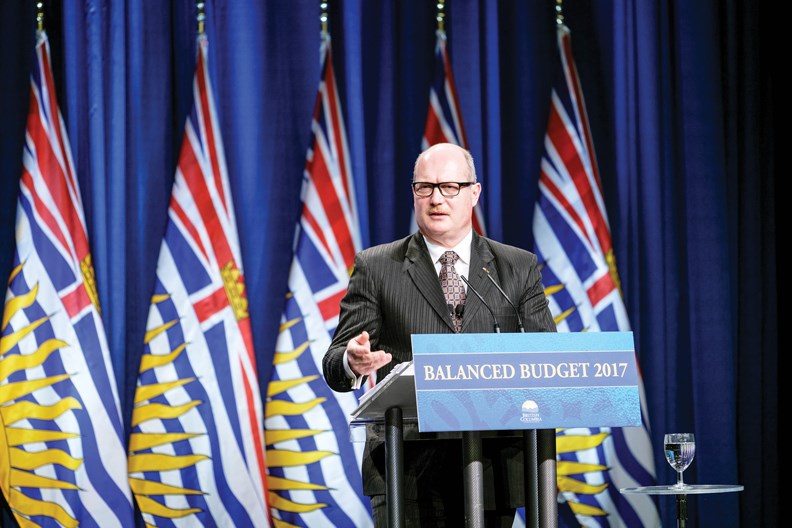The Clark government tabled its pre-election budget this week, and the opposition is calling it a “forget everything” budget designed to draw attention away from years of neglect, cuts and fee hikes.
Finance Minister Mike de Jong, on the other hand, characterized the province’s fifth consecutive balanced budget as one that “delivers the dividends of a strong and diversified economy and prudent fiscal management by cutting costs for middle-class B.C. families, investing in priority programs and services, and promoting a competitive, job-creating economy.”
One of the biggest moves in the budget is rolling back Medical Services Plan (MSP) premiums by 50 per cent, erasing increases made since the mid-90s. De Jong also said the government wants to eliminate the MSP altogether “as it becomes affordable.”
Education spending will increase by $740 million over three years, including $228 million to pay for costs tied to enrolment growth and $320 million in interim funding while the government finalizes a new agreement with the BC Teachers’ Federation on class size and composition.
The Ministry of Health will see a three-year increase of $4.2 billion over its 2016-17 base budget, including $100 million for tackling mental health and substance use issues and $2.7 billion for capital projects.
Other highlights include:
• $287 million over the next three years to the Ministry of Children and Family Development.
• $199 million to fund a $600 per year increase to income assistance rates for persons with disabilities.
• $175 million to provide income assistance supports for those in need, including $8 million to exempt additional child-related benefits.
• An increase in the threshold for property transfer tax relief under the first-time homebuyers’ program to $500,000.
• Eliminating PST on electricity over the coming two years, a move expected to save small, medium, large and industrial businesses throughout the province $164 million by 2019-20.
• Cutting the small business corporate income tax rate to two per cent from 2.5 per cent.
• $13.7 billion over three years in infrastructure spending.
Reaction from candidates in Powell River-Sunshine Coast followed party lines, with NDP MLA Nicholas Simons and Green Kim Darwin accusing the government of trying to cover up harmful cutbacks in the past, while Liberal Mathew Wilson highlighted some opportunities that could come with new money for capital projects in the health ministry.
“Overall what we’re seeing is a government that’s been neglectful for the past 16 years, and now we see an effort to try to make up for that with money that should have been properly invested over those years,” Simons said.
“If, in fact, the government were prudent fiscal managers then we wouldn’t have the negative impacts of their choices popping up everywhere from child welfare to seniors care to services and programs for disability … We have an unexpected surplus due to property values [rising] essentially. This is a blip.”
Darwin wasn’t impressed either.
“This balanced budget is really nothing more than creative accounting and political opportunism through and through,” Darwin said. “Now that the election is looming they’ve opened up the tax-money bag in an effort to woo amnesiac voters.”
Wilson, though, said, “There are a number of wins for the people of British Columbia, in particular in this riding.”
Wilson said dropping the PST on electricity could mean significant savings for Howe Sound Pulp and Paper in Port Mellon and Catalyst in Powell River, which he’s hoping to see the companies reinvest in equipment upgrades and skills training for workers. He also sees good news in the money for capital spending in the health ministry.
“That means there’s a potential for us to go out there and get capital funding for repurposing Shorncliffe and Totem,” Wilson said. “That’s money that wasn’t on the table before.”
Darwin, who works in the mortgage industry, is particularly critical of the $700 million earmarked for the BC Home Partnership Program – the plan announced in January to provide interest-free loans to help buyers with down payments. “This program actually burdens homebuyers with more debt and it reduces their housing affordability … Also, CMHC is charging higher premiums for these mortgages and not all lenders are even participating.”
Darwin also said seniors funding was “glaringly” absent as well as money for other key areas.
“It is frightening to notice the lack of funds attributed to protection and management of B.C.’s environment,” she said. “There are no new funds slated for the next three years for conservation officer services, the Climate Action Plan, environmental sustainability, the Sustainable Environment Fund or the Environmental Protection Agency.”
According to Simons, there were a lot of gaps. “This government tries to convince itself that everybody just wants tax cuts, but sometimes we need services that will fill the gaps … We have serious deficits in our social support networks.”
Wilson acknowledged that Liberals will have to answer criticism of the budget on the campaign trail, but he thinks it sent a message that, under the Liberals, B.C. is in a solid financial position. “We don’t want to pat ourselves too much on the back. There is still work to be done, but I think it indicates to voters that there is a real focus on putting money back in the pockets of British Columbians.”
There weren’t any specific Sunshine Coast initiatives announced in the budget, but the province announced ahead of the Feb. 21 budget speech that it would be adding $10 million to the Island Coastal Economic Trust (ICE-T). In the past, ICE-T funding has supported the Gibsons Public Market, the creation of the Sunshine Coast’s new economic development agency, and the Visitor Information Park at the Langdale bypass.



